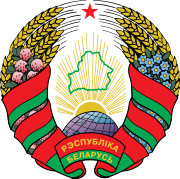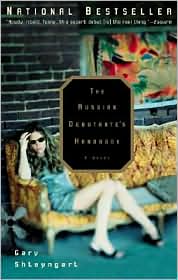It was 7:00 in the morning and still dark outside when we climbed into the JDC minivan and began our journey to Borisov and Chashniki. Passengers included Natasha, director of logistics for JDC Minsk, Arieh, director of strategic planning for the JDC in New York, and Sebastian and Erica, my fellow JDC volunteers. The purpose of our journey was twofold: we were on our way to Borisov in order to meet with leaders of the Jewish community center, and after, to make the journey to the small village of Chashniki in order for Arieh to reconnect with his ancestral roots through a very meaningful visit to the still-intact Jewish cemetery (a rarity in Belarus) and the village's few remaining Jews.
Many Jews come to this region to visit the shtetlekh of their ancestors whose lives were likely characterized by a combination of rich Jewish traditions, poverty, and persecution at each turning point in the region’s tumultuous history. Many fled or were murdered but managed against all odds to create the legacy of some of the greatest achievements of the Jewish people, collectively and individually, throughout Jewish history. Moreover, their legacy includes the important work of the JDC, and the revival of Jewish life here today. The synthesis of past, present, and future for Jews in this region was never more apparent for me than on the day of our visit to Borisov and Chashniki.
 We were greeted in Borisov by the leaders of the Jewish community. They gave us a tour of their Jewish community center and expressed their hopes and plans for future programs and provided us with tea and cookies. We then participated in a lively Yiddish singing session with the community center’s pension-aged group (see Eritchka’s babushka of the month). Many shared their stories of survival through some of the most difficult periods of Jewish history, including the Holocaust, which obliterated approximately 800,000, or 90% of the Jews in Belarus. Everyone we spoke to had experienced at least one miraculous turn of events to which they could attribute their survival. Located amidst industrial back lots and heaps of wood and rubber, the Borisov Jewish community center was an unlikely place to find such lively Yiddish singing and such a warm community for the area’s pension aged Jews.
We were greeted in Borisov by the leaders of the Jewish community. They gave us a tour of their Jewish community center and expressed their hopes and plans for future programs and provided us with tea and cookies. We then participated in a lively Yiddish singing session with the community center’s pension-aged group (see Eritchka’s babushka of the month). Many shared their stories of survival through some of the most difficult periods of Jewish history, including the Holocaust, which obliterated approximately 800,000, or 90% of the Jews in Belarus. Everyone we spoke to had experienced at least one miraculous turn of events to which they could attribute their survival. Located amidst industrial back lots and heaps of wood and rubber, the Borisov Jewish community center was an unlikely place to find such lively Yiddish singing and such a warm community for the area’s pension aged Jews.

 The forests faded into fields of snow and rickety wooden fences into dachas with smoke drifting out of their little chimneys. I couldn’t stop looking out the window and taking in the scenery so foreign to my eyes. It was on this long drive to Chashniki when Arie shared his family story with us. How moving, all the small miracles and twists of fate that had to occur in order for us to be on our way to Chashniki that day, and for Arie to have attained the precious memories of his past.
The forests faded into fields of snow and rickety wooden fences into dachas with smoke drifting out of their little chimneys. I couldn’t stop looking out the window and taking in the scenery so foreign to my eyes. It was on this long drive to Chashniki when Arie shared his family story with us. How moving, all the small miracles and twists of fate that had to occur in order for us to be on our way to Chashniki that day, and for Arie to have attained the precious memories of his past.
He thoughtfully recounted his story to us and allowed me to share it here:
"My grandmother Edie was born in 1923 in Vitebsk in the USSR. In 1925, she arrived in Sydney, Australia with Liza, her mother. Liza had been so traumatized by whatever she had experienced in Belarus during those years -- including the death of Edie's father before the baby's birth -- that she simply never spoke a word of that place and time. Edie -- or Eta as she was originally named -- spent many decades with a deep sense of emptiness about her own family and her past: she knew almost nothing about her father, about her mother's parents or brothers and sisters, about what had happened that propelled her mother to voyage across the Soviet empire and over the ocean to the most distant land imaginable.
In the 1970s, a few years after her mother's death, Edie wrote a letter to a distant relative in the US of whom she had some knowledge. The relative was Nathan Cohen, a retired and elderly gentleman living in New Jersey. Nathan was Edie's first cousin. In her letter, Edie wrote asking if he could tell her something about her mother's life and family before she moved to Australia. Because of his advanced age, Nathan decided not to write back, but to speak to her on audio cassettes. Over a series of months, Nathan recorded a number of cassettes that he sent in installments to Edie. He told her the story of Liza's life -- and the story of the first few years of Edie's life.
Nathan's cassettes were a true gift -- they restored to Edie a part of her own self. Nathan told of Chashniki, the shtetl in which the family had lived for some generations. He spoke of Edie's grandfather the blacksmith, of aunts and uncles and cousins, of the bandits and violence that characterized the Civil War and the years that followed, of shtetl life. Edie's own story was that her father, who worked as a technician in a veterinary hospital in the city of Vitebsk, had contracted an infection and died before his daughter was born. Liza found herself with a baby girl, but bereft and with no means of support. For a few months, she put Edie in a Jewish children's home in Vitebsk, visiting her whenever possible. After some time, Nathan told my grandmother that the family decided to bring Edie to Chashniki, so they went -- on a horse and carriage -- and took her out of the home. Nathan remembered Edie's arrival in Chashniki -- "you were a bag of bones, Edie". They fattened her up with home cooking, and some months later Liza decided to leave the USSR entirely and start a new life in Australia.
As a child, I remember when my grandmother received the cassettes from Nathan, and how moved she was to have made this connection to a relative and to her own story. I have listened to them many times. Through my grandmother, they are a living connection to my heritage. I was the first of Liza's descendants to return to visit Chashniki, four years ago. My experience then, and again a few weeks ago, have become a precious part of my own identity. Liza may have never wanted to step foot again in the land of her past. But I hope she may have found some joy in the fact that, when one of her descendants made the journey back to Chashniki, he recited the names of every one of her dozens of descendants."
We drove into Chashniki and met Liev and Costia, two older Jewish men whom Arie had met during his first visit, four years ago. Liev and Costia represent two-thirds of the Jewish population remaining in the village of Chashniki. Costia lead us through the snow to the Jewish cemetery, which he maintains himself. He showed us the grave of his mother and we searched, albeit unsuccessfully, for grave stones that bore Arie’s family name.

(Liev's House, Chashniki)

(Costia and Arieh at the Jewish cemetery)

(Costia wiping snow from a grave stone in the Jewish cemetery)
 Then Liev invited us to his home, led us through his garden which provides him and his wife with nearly all of their sustenance each year, showed us the chickens in his chicken coop, and told us the remarkable story of how his non Jewish father hid his Jewish mother in the underground cellar in their home during the Holocaust- the very home into which he invited us that day.
Then Liev invited us to his home, led us through his garden which provides him and his wife with nearly all of their sustenance each year, showed us the chickens in his chicken coop, and told us the remarkable story of how his non Jewish father hid his Jewish mother in the underground cellar in their home during the Holocaust- the very home into which he invited us that day.
(Liev showing us his cellar)
Our visit to Borisov and Chashniki bolstered the intentions of my work as a volunteer with the JDC, an organization committed to the “rescue, relief, and rehabilitation” of Jewish communities worldwide. The stories of the Yiddish singers at the Borisov Jewish community center, of Arie’s great grandmother and her unimaginable journey from Chashniki to Australia, and of Liev and Costia who remain in Chashniki amidst the memories of the past, honoring those memories steadfastly by maintaining the Jewish cemetery and some semblance of a Jewish life against the backdrop of destruction-- These stories, so much more than just stories, are catalysts, sparks, driving forces behind every Jewish holiday I introduce to my young Mazel Tov students, every Shabbat meal I host at Moishe House Minsk, and each day that I enter the Minsk Jewish Campus and feel the force, vigor, and conviction of this living, breathing, dynamic Jewish community.






































